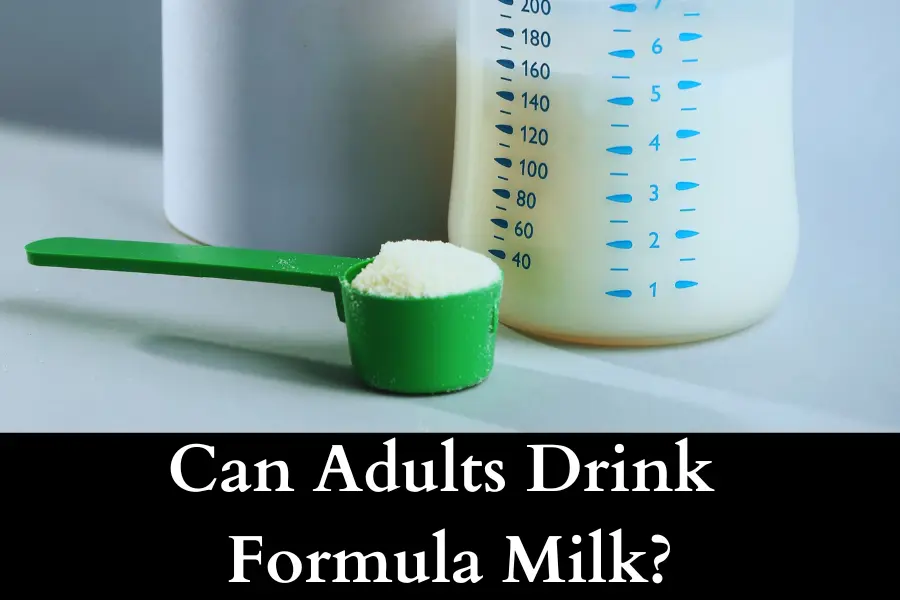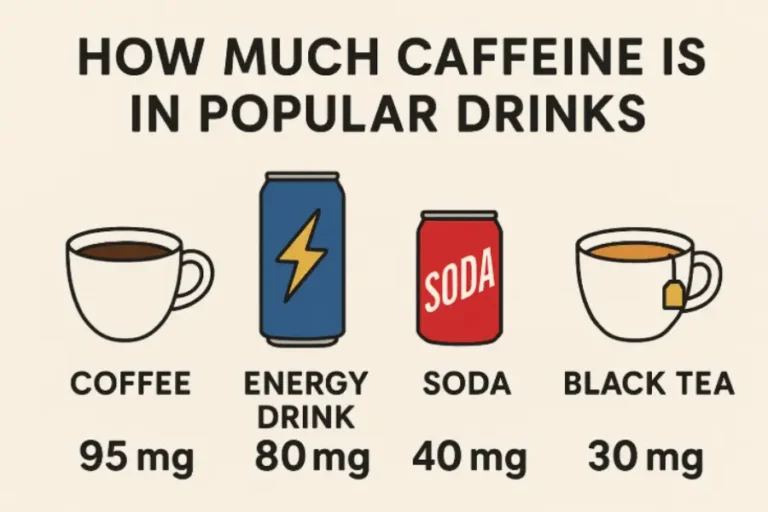Can Adults Drink Formula Milk? Are there Any Benefits?
Many people wonder: Can adults drink formula milk for nutritional benefits? Adults can drink formula milk, but it’s not designed for them. While it can offer some nutrients, it’s not the ideal long-term option.
Want to know more about the benefits, downsides, and alternatives? Keep reading to discover everything you need to know about formula milk for grown-ups!
Key Points
- People can safely drink formula milk but shouldn’t make it a habit.
- Formula milk is gentler in digestion compared to regular milk.
- It offers some vitamins and minerals but lacks adult-specific nutrients like fiber.
- Too much formula milk may lead to excessive sugar intake.
- Grown-ups should use formula milk as a temporary solution during illness or recovery.
Can Adults Drink Formula Milk? (Everything to Know)
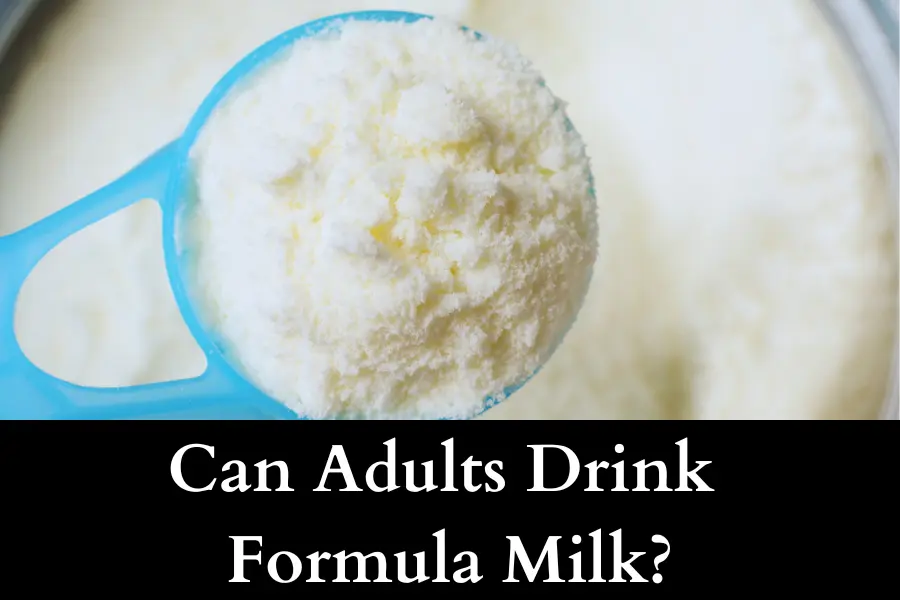
Adults can drink formula milk, but it isn’t designed for them. The formula is made for infants, which means it does not contain nutrients that men and women need. It lacks calories, protein, and certain vitamins.
For older people, a balanced diet is recommended. It should include whole foods to meet nutritional needs.
However, formula milk still offers some nutritional benefits:
Nutritional Benefits of Formula Milk for Adults
Formula milk can provide some benefits to people. Each serving typically includes essential vitamins like A, D, and E, as well as calcium, which helps keep bones strong.
Additionally, it’s rich in iron, which is important for carrying oxygen in the blood.
That said, formula milk isn’t a replacement for a well-rounded adult diet. It lacks the fiber and other components of whole foods that people need.
What Happens When Adults Drink Baby Formula?
When adults drink baby formula, they might experience various effects. For one, it may not fully satisfy a person’s nutritional needs.
Furthermore, Grown-ups might also find formula milk too sweet. Note that this milk is made with sugars to replicate the natural sweetness of breast milk. This could lead to some discomfort, like bloating or gas.
However, for those with sensitive stomachs, baby formula can be a blessing. It’s because this milk is easier to digest.
Is It Safe for Adults to Drink Formula Milk?
Yes, it’s generally safe for adults to drink formula milk. The ingredients in baby formula aren’t harmful to men and women. But making it a regular part of a diet isn’t advisable because it lacks fiber and protein in the right amounts.
It’s also more expensive than regular milk or other nutritional drinks made for adults.
For a refreshing change, why not try the Aloha Thunder drink? It’s a great alternative to formula milk if you’re looking for something unique.
How Is Formula Milk Different from Regular Milk?
Formula milk and regular milk serve different purposes. Formula milk is made to mimic breast milk as closely as possible, while regular milk, like cow’s milk, is more commonly consumed by grown-ups. The biggest difference lies in their composition.
Formula milk often contains a mix of:
- Proteins
- Fats
- Carbohydrates
- Added vitamins and minerals.
These ingredients help babies grow.
In comparison, regular milk, such as cow’s milk, mostly contains calcium, protein, and vitamin D. It doesn’t have the added nutrients specifically for babies.
Another key difference is that formula milk is easier to digest for babies, while regular milk might be too heavy or hard to break down for infants. For older people, regular milk is generally fine unless they have lactose intolerance.
Here’s a table about Formula milk vs regular milk:
| Aspect | Formula Milk | Regular Milk |
| Target | For infants/toddlers | For general consumption (all ages) |
| Composition | Fortified with nutrients | Naturally contains essential nutrients |
| Lactose | Reduced or modified | Contains natural lactose |
| Protein | Modified for easy digestion | Natural casein and whey |
| Digestibility | Easier for infants | Can cause issues in infants/lactose intolerant |
| Source | Processed ingredients | Directly sourced (e.g., cow’s milk) |
| Added Nutrients | Extra vitamins and minerals | Naturally occurring, some fortified versions |
| Allergens | Hypoallergenic options available | Natural allergens for some |
| Shelf Life | Longer (unopened powdered form) | Shorter, usually refrigerated |
| Sugar Content | May contain added sugars | Natural lactose (no added sugars) |
Which is the Best Formula Milk for Adults?
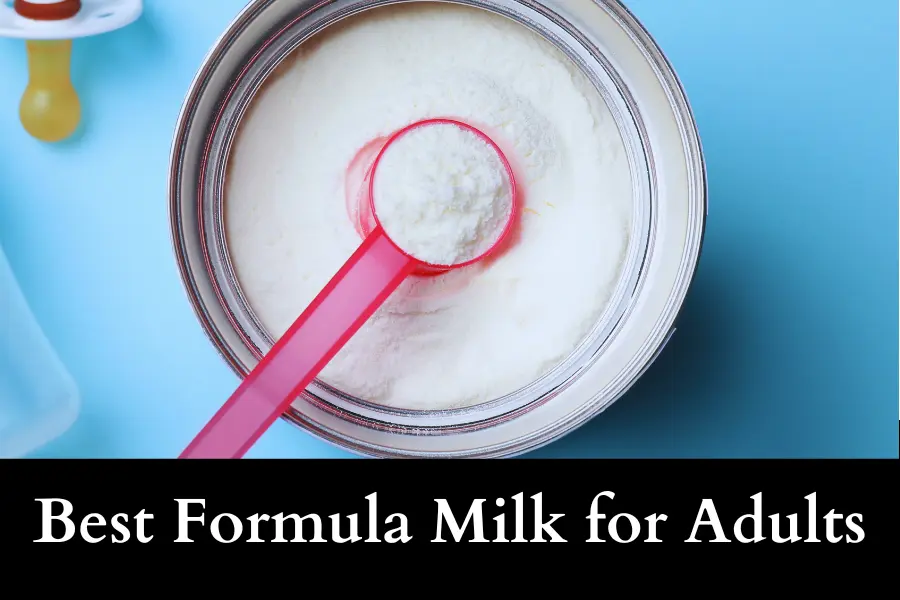
The best formula milk for adults depends on individual needs. But generally, formulas with higher protein content are recommended. Check out these three:
Standard Baby Formula
Standard baby formula can be an option for those who need a gentle, nutrient-rich liquid. These formulas contain a balanced mix of:
- Fats
- Carbohydrates
- Proteins.
For people recovering from illness or with sensitive stomachs, this could be a good choice.
Lactose-Free Baby Formula
Lactose-free baby formula is another option for adults who can’t tolerate lactose. Many experience lactose intolerance, which makes regular milk hard to digest.
While this can be useful for older people, it’s still not designed for their complete nutritional needs.
Specialized Formula for Sensitive Adults
Some specialized formulas are made for both babies and people with specific medical needs, like those recovering from surgery or illness. These types of formulas are designed to be easy on the stomach. They can work well for elders who have trouble eating regular foods.
Is There a Special Way Adults Should Consume Formula Milk?
Yes, adults who choose to drink formula milk should consume it as a supplement, not a main meal replacement. It’s best used occasionally, such as during illness or recovery, rather than as an everyday drink.
As a Supplement
Formula milk for adults should be considered a supplement rather than a meal replacement. Grown-ups have different nutritional needs than babies, and formula doesn’t provide everything needed for a balanced diet.
It can be helpful in cases where you might need extra nutrition, but it shouldn’t replace regular meals.
For example, if you’re recovering from surgery and can’t eat solid foods, you can drink baby formula. But over time, it’s important to return to a balanced diet with whole foods.
Mixed with Other Nutritional Sources
For grown-ups, it can be helpful to mix formula milk with other nutrient-rich foods or drinks. For example, you can mix formula milk with fruits or oats. This way, you can enjoy the benefits of formula while still getting other important nutrients.
Why Do Some Adults Consider Drinking Formula Milk?

Many adults think about drinking formula milk for specific reasons, including:
- Health benefits
- Digestive ease
- Curiosity about its nutritional profile.
Health Recovery
Some people turn to baby formula during recovery from illness or surgery. When you’re feeling unwell, eating solid food can sometimes feel challenging. Formula milk provides calories, proteins, and vitamins in a liquid form that’s easy to consume.
However, while formula milk may help with short-term recovery, it’s important to switch back to a nutrient-rich diet.
Digestive Issues
Older people with digestive problems might consider baby formula because it’s gentle on the stomach. Some people can’t tolerate regular dairy products or have conditions. Formula milk is easy to digest for babies, which might also make it helpful for such adults.
Want an example? Those with irritable bowel syndrome (IBS) find baby formula a smoother option compared to other types of milk.
Curiosity or Convenience
In some cases, grown-ups are simply curious about formula milk. They might have heard of others using it and want to see if it could offer any benefits for them. It’s also readily available and easy to prepare, which might make it an appealing option.
Are There Any Downsides to Adults Drinking Formula Milk?
While baby formula can provide some benefits to adults, there are several potential downsides that need to be considered. It’s not ideal for long-term use, and there are some nutritional and financial drawbacks to be aware of.
Lack of Adult-Specific Nutrients
One of the main issues with drinking baby formula is that it’s not designed to meet adult nutritional needs. Babies require different nutrients in different amounts than grown-ups do.
For example, people need more protein and fiber than what’s found in baby formula. Adults also need more calories, which are not provided in large quantities by formula milk.
So while formula milk can offer vitamins and minerals, it lacks the nutritional balance that grown-ups need.
Higher Sugar Content
Many baby formulas contain added sugars to mimic the sweetness of breast milk. While this is beneficial for babies, it’s not ideal for adults. Consuming formula regularly might lead to an excessive sugar intake, which could cause weight gain.
Cost
Another downside to drinking baby formula is the cost. Formula milk is designed to be a premium product for babies, which means it’s often more expensive than regular milk. Over time, this cost can add up, especially if you’re consuming it regularly.
Note that there are a lot of cost-effective ways to get the nutrients found in baby formula. Let’s discuss this now.
What Are the Alternatives to Formula Milk for Adults?
Alternatives to formula milk for adults include plant-based options like almond, soy, oat, and coconut milk. Lactose-free milk, goat milk, and protein shakes are also popular.
Nutritional Shakes

Nutritional shakes, like Ensure or Boost, are great alternatives. They are designed specifically to meet adult nutritional needs and contain more protein, vitamins, and minerals.
Nutritional shakes come in various flavors and can be found in most grocery stores. Unlike baby formula, these shakes are made with adults in mind. That’s why they are more appropriate options for long-term use.
Plant-Based Milk
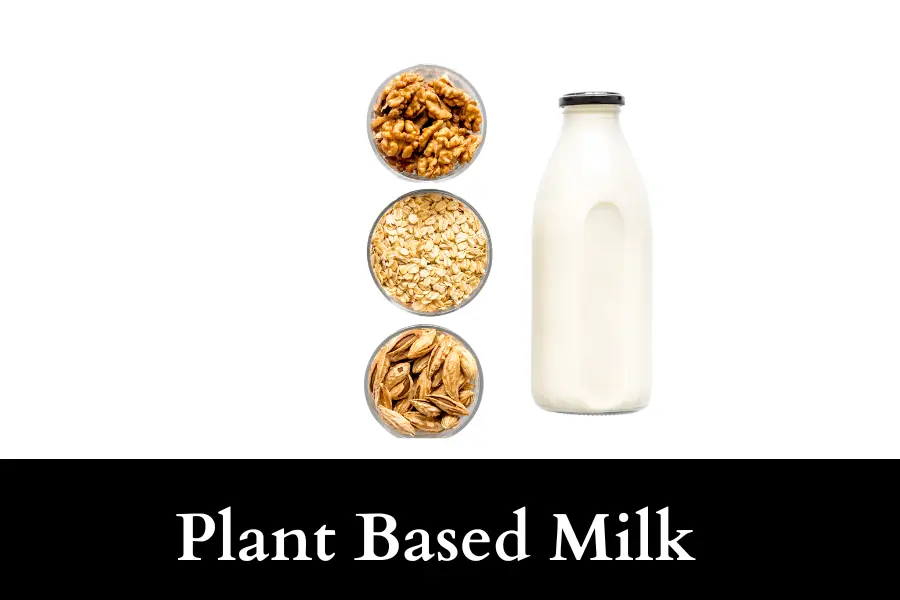
Plant-based milk can also be a great choice. It is typically lower in sugar and easier to digest. Moreover, Plant-based milk is widely available and can be used in the same ways you’d use regular milk.
Meal Replacement Powders
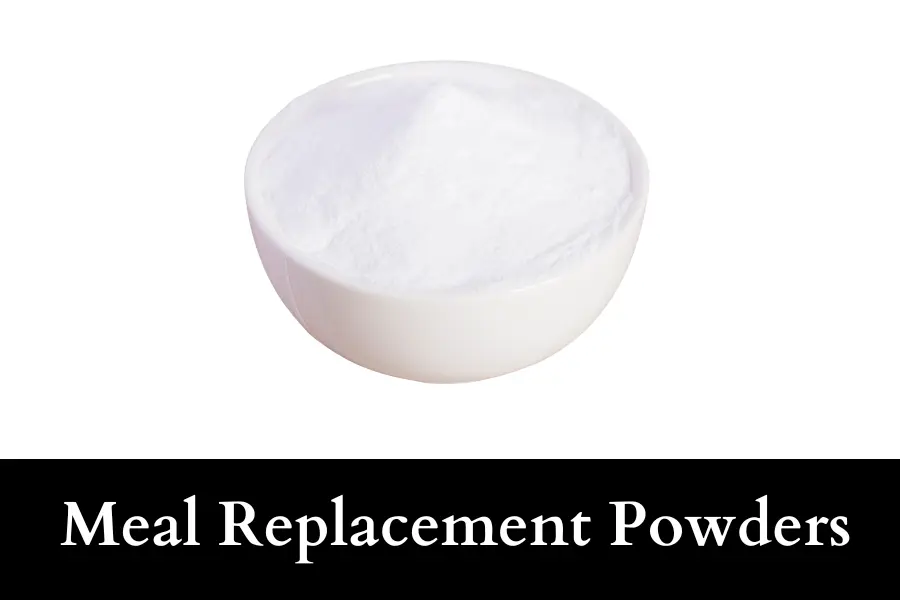
Meal replacement powders, such as those from brands like Huel or Soylent, are good alternatives. These powders can be mixed with water or milk to create a complete meal.
Unlike baby formula, they are specifically formulated for adults and can help meet daily nutritional requirements.
Protein Shakes
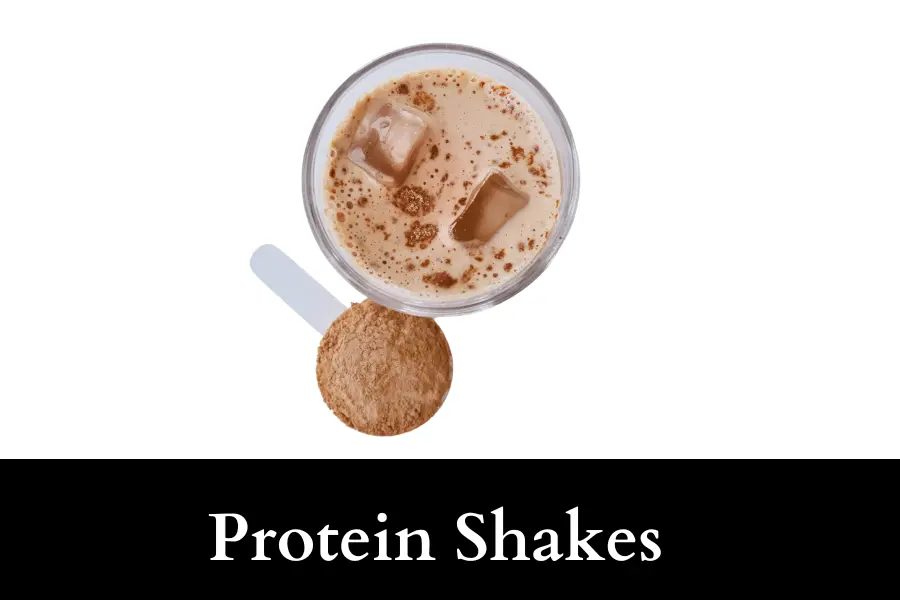
For those looking for a nutrient-dense option, protein shakes are a great alternative. They offer high levels of protein, which is essential for muscle repair and energy.
Many protein shakes also come with added vitamins and minerals to support overall health. This makes them an excellent choice for people who want a nutrient boost.
Moreover, protein shakes are easy to prepare and can be found in many flavors.
Whole Foods
For adults, the best alternative to baby formula is simply eating a well-balanced diet that includes whole foods. Foods like fruits, fish, mutton, vegetables, and whole grains provide all the essential nutrients.
Whole foods are also less processed and more natural.
If you’re considering different drink options, find out how much caffeine is in Dr Pepper Zero and whether it’s something you’d like to try.
Conclusion
In summary:
- Formula milk is not meant for adults.
- It lacks essential adult-specific nutrients like fiber and enough protein.
- Regular consumption might lead to excess sugar intake and cost concerns.
- There are better alternatives like nutritional shakes, plant-based milk, and protein powders.
In the end, I suggest opting for smarter and healthier options.

